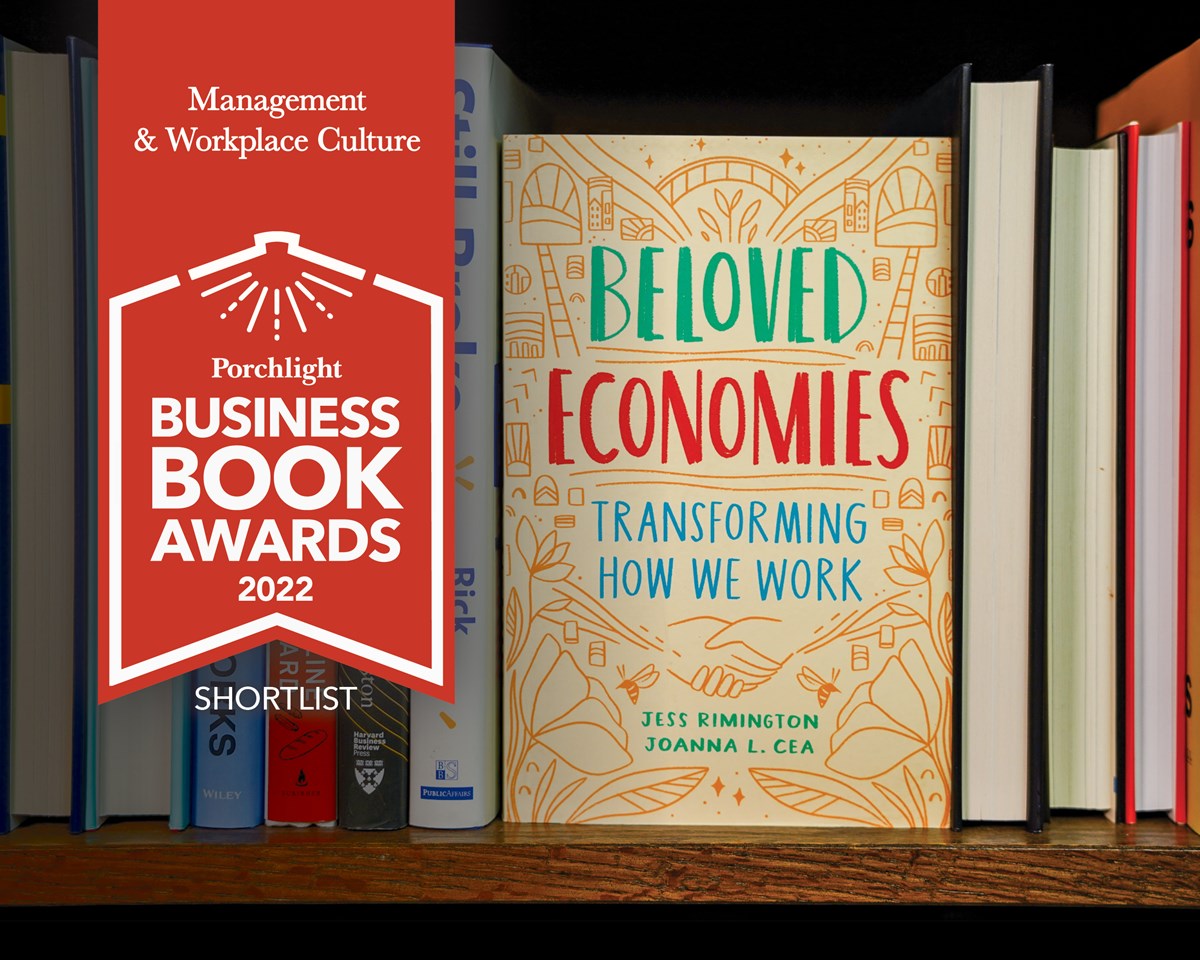Beloved Economies | An Excerpt from the 2022 Management & Workplace Culture Book of the Year
January 10, 2023
The 2022 Management & Workplace Culture book of the year is Beloved Economies: Transforming How We Work by Jess Rimington and Joanna Levitt Cea, published by Page Two.
Jess Rimington and Joanna Levitt Cea have not only pondered what it would look like if we were to build an economy that nurtures us, they show us what that looks like. In Beloved Economies, they take us inside a diverse array of organizations and different circumstances where people are building a more resilient way of working and connecting based on promoting well-being, building community, and making meaning.
The following excerpt is from the first chapter, "Work Isn't Working."

More and more people have arrived at the same conclusion: our current ways of work are not working.
This book is about practices that transform work within our groups, businesses, and organizations—small and large—to provide a pathway out of what isn’t working about work. It is based on our research on teams that are experiencing a particular form of success related to what makes life good—success that feels beloved.
We offer you seven specific practices that are a starting place for creating these changes in how you work. We also share how these deviations from the status quo are effective, and why such pathways into alternatives have been actively suppressed. Through this, we reveal uncomfortable truths about business as usual. And share how we came to uncover a way to generate innovation that audaciously prioritizes well-being, meaning, connection, and resilience alongside traditional metrics like quality and financial success. This book is a call to action: stop missing out on all that becomes possible when we change how we work, and instead step into our collective power for transformation.
IN WHAT HAS been called the Great Resignation, millions of people decided—for one reason or another—that their present work was neither sustainable nor worth it. More than nineteen million people in the United States quit their jobs over a five-month period in 2021,1 and 40 percent of these people did so without having another lined up.2
Looking at the data, it’s easy to see why more and more of us are fed up with and exhausted by the status quo of work. A staggering litany of statistics reveals how physical and psychological strains of the workplace are costing us our lives, while simultaneously leaving most people financially strapped—and often in debt.
It is no exaggeration to say work is killing us. In the United States, workplace-related illness and health issues may con-tribute to more than $200 billion in healthcare costs every year.3 And according to research led by Stanford Graduate School of Business professor Jeffrey Pfeffer, the workplace may be the fifth leading cause of death in the United States,4 over three times the number of deaths in 2020 from motor vehicle accidents.5 For centuries, labor rights organizers have drawn our attention to the bodily harm that workers endure.
According to Dr. Pfeffer, workplace-related stress and illness are taking a growing toll on American workers and the health-care system. As Dr. Pfeffer explains, “Seven percent of people in one survey were hospitalized—hospitalized!—because of workplace stress; 50% had missed time at work because of stress. People are quitting their jobs because of stress.”6
Citing statistics that show as much as 75 percent of the disease burden in the US is chronic,7 Dr. Pfeffer points out, “[T]here is a tremendous amount of epidemiological literature that suggests that [many chronic diseases such as] diabetes, cardiovascular disease, and metabolic syndrome . . . come from stress . . . [T]here is a large amount of data that suggests the biggest source of stress is the workplace.”8 In other words, researchers believe our workplaces are causing chronic disease. “I look out at the workplace and I see stress, layoffs, longer hours, work-family conflict, enormous amounts of economic insecurity,” says Dr. Pfeffer. “I see a workplace that . . . [is] shockingly inhumane.” 9
Simultaneously, millions of people are finding it hard to obtain enough work hours to qualify for benefits and pay their bills. With hours fluctuating at the demand of their employers and sometimes customers, many working people are struggling to ensure a predictable and reliable schedule. The US Federal Reserve found in 2020 that 16 percent of American part-time and temporary workers’ schedules fluctuated based on their employers’ needs.10 As summed up in a New York Times opinion piece by economic journalist Bryce Covert, “The people who suffer from just-in-time scheduling that never quite adds up to a normal 9 to 5 aren’t spending their off hours on leisure. They’re working second and third jobs. They are hovering over an app to find out if they’re going to be called into work and are scrambling to piece childcare and transportation together if and when they are.”11 Even those who hold stable jobs are often struggling to make ends meet or build up savings.12
It’s no wonder over half of workers in the United States report being burned out.13 Many of us pour our life force into a week-to-week grind that leaves us feeling exhausted, unwell, and without the financial means to step off—or even take a break from—this frenetic conveyor belt.
To top it all off, not only is work failing us humans, it’s also devastatingly evident that the predominant economic system, which our ways of work uphold, is endangering other forms of life on Earth. From the very real effects of climate change, such as wildfires and droughts of unprecedented scale, to the related great waves of extinction decimating countless species to depletion of our agricultural soils,14 the living world is crying out, “This is not working!”
IT WAS A decade ago when we both started to recognize the depth of the problem with our current ways of work. Even though we had gone to work almost every day of our lives, we had not previously examined work. Sure, we had thought a lot about our jobs. After all, in our experience, when we introduced ourselves to a new person, one of the first questions asked was frequently “What do you do?”
When we first met, we surprised one another with how we answered that question. While we each shared what we did for work, we also talked about how we went about it. It was in that moment that we saw something kindred in each other: an unrelenting commitment to how things are done, not just what is being done. We met at a women’s leader-ship training; we were both leaders of organizations at a young age—executive directors of small nonprofits with big dreams. Jess built new approaches to participatory youth-led education that inspired action in communities, and Joanna advocated for policy reform at international institutions, such as the World Bank, to make aid accountable to the people it’s supposed to benefit. At the core of both our work was a dedication to aligning our ways of working with the values we believed in. Thus began a deep friendship that later turned into a close collaboration.
This collaboration began with a shared, burning question: Why are we trapped in exhausting, harmful modes of working, and what is possible when we innovate out of them?
As for many people, our jobs had become a cornerstone of how we perceived our context and identity, or how we fit in society. We had both started working in our teens and were part of a generation that took on student loans so we could go to college and learn how to work better. But it wasn’t until we began our research endeavor in 2015, which eventually led to this book, that we took an in-depth look at how we work, why our current work patterns have us operating in unsupportive systems—and what else might be possible.
We began to see things with fresh eyes. We saw a hustle of survival and overachieving deeply embedded in ourselves and our peers. We observed that not only did the “reward” of moving to the next level only mean more work, we experienced it to also mean continuing to live paycheck to paycheck. More often than not—even when working within nonprofits—we felt we were participating in maintaining a status quo that was neither working for people nor our planet.
Our burning question eventually led to a seven-year research journey, including a shared short-term visiting scholar position at Stanford University and organizing to bring together multifaceted research collaborators. Each of these collaborators brought their own additional questions and insights to the table, which sharpened the emerging analyses through their input. Over time, sixty people from a wide array of teams and enterprises together formed a co-learning community that unearthed clear answers to our burning question.
Excerpted from Beloved Economies: Transforming How We Work.
Copyright © 2022 by Jess Rimington and Joanna Levitt Cea. All rights reserved.
ABOUT THE AUTHORS
Jess Rimington is a next economy strategist focused on the design and ethics of emerging next systems. Joanna Levitt Cea led the human rights organization International Accountability Project for eight years, and is dedicated to reimagining investment to lift up the well-being of all. Both are former Visiting Scholars with Stanford University’s Global Projects Center.





